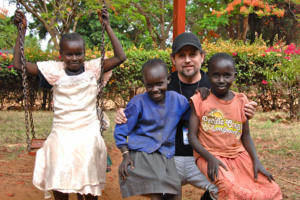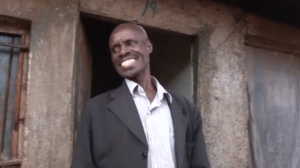
PRESSED BUT NOT CRUSHED
An account from Néstor Colombo, Executive Director, Up & Walk
Just three miles outside of the business district of Nairobi, Kenya, exists a place forgotten. Not for its small size – it is as large as New York’s Central Park – nor its waning population – more than one million people call it home – but forgotten by government, country, and some would argue, even God himself. This place is Kibera, the largest slum in Kenya, the second largest in Africa, and one of the largest slums in the world.
From its haphazard beginnings in the 1920s, when the British colonial government allowed Nubian soldiers to settle on lands just outside of Nairobi, Kibera has always been “forgotten.” The Nubians were part of an ethnic group from Sudan that fought faithfully with the Allies in World War One. As a token of appreciation, the British government rewarded the Nubians with the grounds now known as Kibera. But the reward came with strings attached; the British never handed over the deeds to the land, so the soldiers became squatters with no legal rights. They did not have “legal” grounds to keep the land, yet the government overlooked this fact in exchange for forfeiting its duty to provide sanitation, running water and other utilities, infrastructure, and community development. Over the years, the Nubians have turned to exploiting the land, allowing unprecedented numbers of tenants to live in 10 by 10 foot shanties in inhumane conditions. Today, Kibera’s streets are lined with trash; a “muddy” stream filled with refuse and waste runs through the middle of the slum, and open latrines are shared by blocks and blocks of people.
 For reasons not entirely clear to me, I had a longing to visit Kibera. The sheer desperation and poverty of the people compelled me. Getting there was more difficult than I imagined; my hosts were not as enthusiastic as I was about visiting the slum. They could not understand why I would choose to visit Kibera when safaris, burgeoning cities, and beautiful plains awaited us all across Kenya. Despite their protests, my “gentle” urging of my driver finally afforded me the afternoon in Kibera.
For reasons not entirely clear to me, I had a longing to visit Kibera. The sheer desperation and poverty of the people compelled me. Getting there was more difficult than I imagined; my hosts were not as enthusiastic as I was about visiting the slum. They could not understand why I would choose to visit Kibera when safaris, burgeoning cities, and beautiful plains awaited us all across Kenya. Despite their protests, my “gentle” urging of my driver finally afforded me the afternoon in Kibera.
My nose alerted me to my arrival sooner than my eyes. Quickly deposited by my driver, I got out of the car and had the sensation of walking into an open urinal that had not seen running water or Clorox in its long life. Unlivable conditions. I began to walk through the makeshift streets, decorated with mud, trash, and potholes; rivers of garbage; swarms of flies; shanty-homes made of tin, sticks, and mud; and “living quarters” stacked on top of each other. Each person barely had more than 10 square feet of living space. Forget open spaces for markets, parks, or playgrounds. Children played with garbage, and the adults gathered around the entrances to their homes or wandered the narrow streets. Water was drawn from a river where streams of urine and refuse also flowed. Strange cooking odors wafted through streets, where unknown and even frightening things were being grilled over small fires.
The conditions were astounding – a far cry from my home in Suburbia, USA. My heart went out to these people, yet I was surprised by their ingenuity and their sense of community. I found small “businesses” around every corner; one sold medicines in a make-shift pharmacy, others sold handmade shoes, one corner “market” sold Fanta and vegetables. There was even a local bar.
Yet even more astonishing was the warm reception that I received from the people. There was a camaraderie and a tenderness among the Kiberans. A passing conversation with an elderly lady afforded me an invitation into her humble home. She served me an unrecognizable food, which I willingly ate, under the short roof and encroaching walls of her tiny abode. Children flocked to us, smiling through the flies that landed on their noses, cheeks, and ears to say eagerly, “Hello! How are you?” Their young hearts had not yet been jaded by their humble means.
What I found in Kibera was so much more than soiled streets and crumbling mud walls; what I found there changed something in my heart. I found something unexpected . . . hope.
 I met a curious man that afternoon. David. He began to share his story with me. He had moved into the humble community while searching for a job as a night guard to support his wife and four children. He had called Kibera home for nearly 15 years. This family of six lived in one of those tiny, ten square foot rooms. Each week, they walked for two hours to attend a local church, where they were welcomed and had found acceptance and community. I asked David about his living conditions, about how he dealt with the hard times. He answered me slowly:
I met a curious man that afternoon. David. He began to share his story with me. He had moved into the humble community while searching for a job as a night guard to support his wife and four children. He had called Kibera home for nearly 15 years. This family of six lived in one of those tiny, ten square foot rooms. Each week, they walked for two hours to attend a local church, where they were welcomed and had found acceptance and community. I asked David about his living conditions, about how he dealt with the hard times. He answered me slowly:
We just persevere because…this slum has got a lot of problems. We are just staying here with a lot of poverty. If one cannot decide to live in God’s life, you can’t live in such a place like this. You only kneel down and pray God so much, so that He can make you go over all difficulties…. But I just pray God so much, because I believe if I put all my weight on God’s powers, there is nothing which can shake me…. I have been pushing hard life, but because God is great…He has helped me so much. Because what I have done, when I look back I can’t even explain it to anybody. I only know that God is with me.
David was not the only one who painted a different picture of Kibera. Samuel was a young fellow, just 26 years old. He worked his way through college, finishing with a degree in Chemistry in 2004. He had two small children with his young bride. He mused:
Here in Kenya…it’s a very poor country. But when I was saved I noticed the problem of poverty just doesn’t matter. Since I received Jesus as my personal savior, actually I look at things differently…. Now what I believe is that most of the Kenyans here, when they look at people who came from different countries, they sometimes consider to possess material things to be very important…. Now people have just come to realize that material possession is nothing. But the most important thing is just to possess Jesus Christ in one’s heart…. The most important thing that I have learned…we can control our mind, we can think only the goodness of God, and never mind all these things. Actually when I started to practice that, I have found great joy in my heart.
How many would say the same in his circumstances? How many of us who have every comfort in our centrally-cooled homes would share how our hearts are filled with joy? David and Samuel were not alone. My visit was filled with encounters of people of all ages, people who persevered with enthusiasm despite the terrible circumstances that pulled on my heart. Kibera was a place where disease prospered, poverty reigned, and basic human needs and rights were left unmet, yet the people there shared a different story.
As I was leaving, I wound through the narrow streets back to my rendezvous point with my driver. I came across a small crowd gathered around a charismatic and dynamic gentleman. He had the group captivated as he shared his story in a sing-song voice:
I have a testimony…. I say to hospital, “Bye and Bye!” long time ago. And I accept Jesus as the Lord and Savior…. So there’s a message there that Jesus is the only one who can save people from their sins. So it doesn’t matter how far, how long, you’ve been in sin. But there’s a grace of God, there’s a faith of God, that if we call upon the name of Jesus Christ we can be saved. If we can accept Jesus as the Lord in our hearts, our hearts can be changed, can be transformed…. So when we call upon the name of Jesus, our eyes can be opened. When we call upon the name of Jesus our hearts can be opened…. So there’s Heaven for you and for me. There’s Heaven for Zulu and for Africa.
Kibera forgotten? There are many whose eyes and noses may share a story of despair and misery; the history books recount years of injustice; and at first glance, and the improverished lifestyle make existence seem nearly impossible. Yet the people of Kibera have found a secret source of hope and joy. One who has never forgotten.

YOUR GIFTS CHANGE LIVES
“We are pressed on every side by troubles, but we are not crushed. We are perplexed, but not driven to despair. We are hunted down, but never abandoned by God. We get knocked down, but we are not destroyed.”
– Paul of Tarsus.
GIVE TODAY to help support precious people like David and Samuel in communities in need like Kibera.
